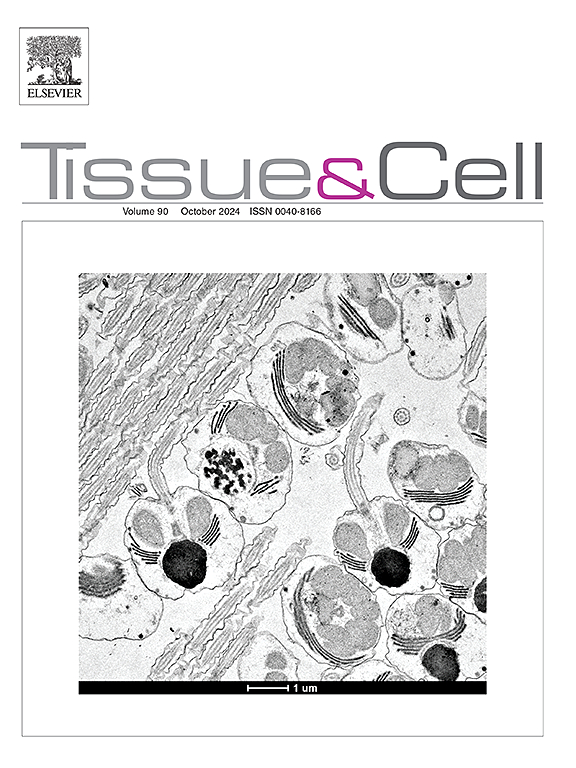Modulatory effect of Eruca vesicaria seeds essential oil on acetamiprid nephrotoxicity via oxidative stress inhibition and regulation of Cox-2, TNF-α, and PPAR-α pathways
IF 2.7
4区 生物学
Q1 ANATOMY & MORPHOLOGY
引用次数: 0
Abstract
Acetamiprid (Aceta) is a neonicotinoid insecticide utilized extensively worldwide, and its environmental and human health risks are of concern. Eruca vesicaria is an edible year-round plant that contains a lot of health-promoting phytochemicals and is an excellent source of antioxidants. So, the present investigation was planned to assess the effect of E. vesicaria seed essential oil versus acetamiprid-induced toxicity in rats. Animals were partitioned into 4 groups of seven each: control, E. vesicaria seeds essential oil (ESEO; 0.17 mL/kg), acetamiprid (Aceta; 21.7 mg/kg), and ESEO plus Aceta, respectively. Doses were given orally and daily for 14 days. Results revealed that ESEO has many phytochemical components with high antioxidant activity. Data showed that treatment with Aceta increased lipid peroxidation and decreased the activities of “enzymatic and non-enzymatic antioxidants” in kidney homogenate. Also, disturbance of kidney and liver function biomarkers, lipid profile, and protein content were observed. These are confirmed by the histological, molecular (Cox-2, TNF-α, and PPAR-α), and renal damage biomarkers (KIM-1 and Cystatin C) examination. On the other hand, rats administered ESEO and then treated with Aceta showed significant amelioration in most of the examined indices. To sum up, ESEO has a potent anti-inflammatory, anti-apoptotic, and antioxidant activity that protects against the pronounced harmful effects of Aceta in rat kidneys due to its health-promoting phytochemicals.
荆芥精油通过氧化应激抑制和调节Cox-2、TNF-α、PPAR-α通路对啶虫脒肾毒性的调节作用
啶虫脒(Aceta)是一种在世界范围内广泛使用的新烟碱类杀虫剂,其环境和人类健康风险令人关注。维丝卡是一种全年可食用的植物,含有大量促进健康的植物化学物质,是抗氧化剂的极好来源。因此,本研究拟探讨荆芥精油对啶虫脒致大鼠毒性的影响。实验动物分为4组,每组7只:对照组、花椒籽精油(ESEO);0.17 mL/kg), Aceta;21.7 mg/kg)和ESEO + Aceta。口服和每日给药,连续14天。结果表明,ESEO含有多种具有较高抗氧化活性的植物化学成分。数据显示,乙酰乙酯处理增加了肾脏匀浆中脂质过氧化作用,降低了“酶促和非酶促抗氧化剂”的活性。此外,还观察了肾脏和肝脏功能生物标志物、脂质谱和蛋白质含量的紊乱。这些通过组织学、分子(Cox-2、TNF-α和PPAR-α)和肾损伤生物标志物(KIM-1和胱抑素C)检查得到证实。另一方面,给予ESEO后再给予Aceta的大鼠在大多数检查指标上都有显着改善。综上所述,ESEO具有有效的抗炎、抗细胞凋亡和抗氧化活性,由于其促进健康的植物化学物质,可以防止乙酰对大鼠肾脏的明显有害影响。
本文章由计算机程序翻译,如有差异,请以英文原文为准。
求助全文
约1分钟内获得全文
求助全文
来源期刊

Tissue & cell
医学-解剖学与形态学
CiteScore
3.90
自引率
0.00%
发文量
234
期刊介绍:
Tissue and Cell is devoted to original research on the organization of cells, subcellular and extracellular components at all levels, including the grouping and interrelations of cells in tissues and organs. The journal encourages submission of ultrastructural studies that provide novel insights into structure, function and physiology of cells and tissues, in health and disease. Bioengineering and stem cells studies focused on the description of morphological and/or histological data are also welcomed.
Studies investigating the effect of compounds and/or substances on structure of cells and tissues are generally outside the scope of this journal. For consideration, studies should contain a clear rationale on the use of (a) given substance(s), have a compelling morphological and structural focus and present novel incremental findings from previous literature.
 求助内容:
求助内容: 应助结果提醒方式:
应助结果提醒方式:


